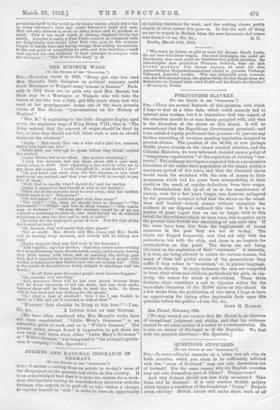. THE MINIMUM WAGE.
[To THE EDITOR OF THE "SPECTATOR...1 SIR,—Macaulay wrote in 1825, "Every girl who has read Mrs. Marcet's little dialogues on political economy could teach Montague or Walpole many lessons in finance." Prob- ably in 1912 there are no girls who read Mrs. Marcet, but there may be a Montague or Walpole who will take the lesson of one who was a little girl fifty years since, and who read at her grandparents' house one of the more juvenile works of Mrs. Marcel, " Conversations on the History of England."
" Mrs. B." is explaining to her little daughter Sophy, aged seven, the minimum wage of King Henry VIII., that is, "The King ordered that the amount of wages should be fixed by law, so that they should not fall below such a sum as should maintain the retainers."
"Sophy : But surely that was a wise and a just law, mamma, and a very kind ono, too?'
`Little girls are very apt to speak before they think,' replied her mother.
[Sophy thinks, but to no effect. Her mother elucidates.]
I keep five servants and pay them about 420 a year each, which comes to 4100. Now supposing a law wore to order me to pay them 425 a-piece. I could not afford it : what should I do '
Oh, you know you must obey the law, mamma, so you must send away one servant, and then your 4100 will be enough to pay four of them.'
Well, that is exactly what I should do,' said her mother. [Sophy is pleased to find herself as wise as her mother.] Then one of the servants must be sent away,' said her mother, 'which shall it be ? The nurse? '
Oh, not nurse ! I could not part with dear nurse!' The cook ?'—' No, then we should have no dinners.'—' The
housemaid ? What! and live in dirty rooms !'—`The coach- man or footman P ' 'Oh dear, the carriage would be of no use without a coachman to drive it ; and what should we do without a footman to open the door and to wait at table?' [So much for the employer's point of view. Now for that of the discharged servants.]
'Oh, mamma, they will easily find other places.'
`Not so easily. Mrs. Brown and Mrs. Jones and Mrs. Smith will be turning away servants, and nobody will be taking now ones,'
[Sophy suggests they may find work in the factories.] And suppose,' says her mother, that they arrive some evening at a manufacturing town, downhearted, weary, and hungry, having very little money with them, and on reaching the factory gate they find it impossible to pasAhrough the throng of people with woeful countenances and tearful eyes who are coming out.' [This is the result of the millownor being obliged to discharge half his hands.] . . So all these poor discarded people must become beggars.' Oh, mamma, how shocking!'
' And, moreover, there will be less corn grown, because there will be fewer labourers to till the fields, and less cloth made, because there will be fewer hands to tend the mills. So there will be less food and loss clothing for the people.' Oh what a deal of mischief I Now I see I was foolish to speak as I did, and yet it sounded so well at first.'" " MennET! thou shouldst be living at this hour !"—I am, Sir, &c., A LITTLE GIRL OF THE 'SIXTIES.
[We have often wondered why Mrs. Marcet's works have not been republished. " Little Mary's Grammar" is an admirable piece of work, and so is "Willie's Seasons." The present writer always found it imperative to put down his own book and listen when either "Little Mary's Grammar" or " Willie's Seasons " was being read to " the youngest gentle. man in company."—En. Spectator.]






































 Previous page
Previous page